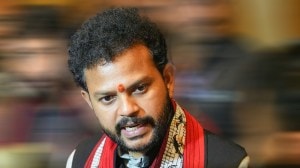This Quote Means | Bhagat Singh: ‘Mere faith and blind faith is dangerous: It dulls the brain and makes a man reactionary’
In the week of the 92nd anniversary of Bhagat Singh’s death, we remember a quote by the revolutionary freedom fighter from his essay ‘Why I Am an Atheist’. Quotes by famous historical figures form an important part of the syllabus for the UPSC CSE Essay paper.
 Prior to his execution, Singh spent nearly two years in prison. However, these were not two years of inaction. During his time in prison, Bhagat Singh led a massive hunger strike, demanding better conditions for his fellow inmates, all while reading and writing vociferously. (Photo: Wikimedia Commons)
Prior to his execution, Singh spent nearly two years in prison. However, these were not two years of inaction. During his time in prison, Bhagat Singh led a massive hunger strike, demanding better conditions for his fellow inmates, all while reading and writing vociferously. (Photo: Wikimedia Commons)On March 23, 1931, Indian revolutionaries Rajguru, Sukhdev and Bhagat Singh were hanged for their role in the killing of British police officer John P Saunders. The day has since been marked as Martyr’s Day to remember the national heroes, with leaders across the subcontinent – even those who disagreed with their methods – hailing their bravery and chastising the British for what was termed as a ‘judicial murder’.
Prior to his execution, Bhagat Singh spent nearly two years in prison. However, these were not two years of inaction. During his time in prison, he led a massive hunger strike, demanding better conditions for his fellow inmates, all while reading and writing vociferously. In fact, much of what is known about his ideas come from what he wrote during his time in prison.
One of the most poignant pieces of writing by Singh is his essay titled ‘Why I am an Atheist’. This was originally penned down in October 1930, around the time he was sentenced to death, while Singh was an inmate at the Lahore Central Jail. It was a reply to his more religious friends who felt that he became an atheist out of sheer vanity.
Here, we take a look at an excerpt from this essay. Notably, quotes by famous historical figures form an important part of the syllabus for the UPSC CSE Essay paper. Also, themes around faith, religion, spirituality and wisdom have appeared in various forms in the UPSC examination, especially in the philosophical context. Questions have been asked about spirituality and scientific temper (2003) and ‘new cults and godmen: a threat to traditional religion’ (1996).
The quote
The full passage goes like this:
“Any man who stands for progress has to criticise, disbelieve and challenge every item of the old faith. Item by item he has to reason out every nook and corner of the prevailing faith. If after considerable reasoning one is led to believe in any theory or philosophy, his faith is welcomed. His reasoning can be mistaken, wrong, misled, and sometimes fallacious. But he is liable to correction because reason is the guiding star of his life. But mere faith and blind faith is dangerous: it dulls the brain and makes a man reactionary.”
In this passage, Bhagat Singh outlines why reason, rather than blind faith, should drive anyone who believes in progress. Singh uses the term ‘faith’ in two different ways in the above passage. First, as a synonym for religious beliefs (‘old faiths’) and second, simply as faith (complete trust or confidence in someone or something) itself.
Bhagat Singh’s problem is not with faith itself but ‘blind faith’
Singh writes that as long as reason is one’s ‘guiding star’, faith is welcome, even if it may be misplaced. This is because being reasonable presupposes being questioning and open to change one’s views. Our knowledge is fundamentally incomplete – there will always be ‘more to know’ than what is known at present. This means that our ‘faith’ has to reflect this.
For instance, for the longest time, it was believed that the earth was at the centre of the universe. In fact people like Galileo who said otherwise were ridiculed and sometimes, even persecuted. Today, we know without a doubt that our planet is but a tiny, insignificant speck in the vast nothingness of the universe. This change in our ‘belief’ came with advancements in science and humankind’s collective gathering of knowledge. Mere faith in Earth’s uniqueness amidst overwhelming evidence otherwise would be dishonest and nonsensical.
Similarly, ‘mere faith and blind faith’ in any fact, any religious teaching, in any god, is also ‘dangerous’.
Why is blind faith dangerous?
Bhagat Singh’s answer to this reflects his leftward leanings.
Marx famously wrote in his introduction to ‘Critique of Hegel’s Philosophy of Right’ (1844), “Religion is the sigh of the oppressed creature, the heart of a heartless world, and the soul of soulless conditions. It is the opium of the people (often translated as ‘masses’).” Similarly, Singh says blind faith “dulls the brain”.
While Marx is referring to religion more in its systematised and organised form, criticising religious institutions, Singh refers to it at a more individualistic level. However, for both the writers, religion and blind faith engender a certain kind of passivity in human beings. They make humans not question the injustice that surrounds them and blindly follow authority, even to their own detriment.
It also makes them “reactionary” to criticism and censure. Even a completely reasonable challenge to someone’s beliefs can draw unreasonable, often violent, responses. Take for instance the opposition to recent Seattle anti-caste discrimination laws. While there can undoubtedly be debate regarding the specifics of the law as well as its efficacy, unequivocally calling them ‘anti-Hindu’ is a reactionary response, which does not engage with the very real discrimination faced by Dalits in India as well as abroad. After all, the law was made on the back of multiple instances of caste discrimination that have been recently reported in the United States.
Bhagat Singh’s own example to substantiate this point is also interesting. He says, “Because Mahatamaji (Gandhi) is great, therefore none should criticise him. Because he has risen above, therefore everything he says —may be in the field of Politics or Religion, Economics or Ethics— is right. Whether you are convinced or not you must say: ‘Yes, that’s true’. This mentality does not lead towards progress. It is rather too obviously reactionary”.
The mark of a true revolutionary
“Criticism and independent thinking are the two indispensable qualities of a revolutionary”, Bhagat Singh writes later in the essay. This is the larger point that the quote being discussed makes. By no means is believing in something itself bad. But when it is blind, and unquestioning, this belief can be dangerous. It is imperative for humans to continue to question what is in front of them, whether it be material conditions, seemingly infallible leaders or religion.
In a country where Bhagat Singh remains one of the tallest national icons to date, it will be wise to think about his words and put them into action for once. In the face of the hold that dogma, superstition, and religious fundamentalism continue to have over the people of India, Bhagat Singh offers an alternative vision, one based on rationality and critical thought.
- 01
- 02
- 03
- 04
- 05






































